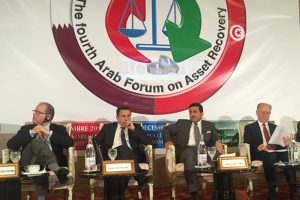 In the first part of this blog series we discussed how Germany is a country at high risk of money laundering due to the financial system’s secrecy. This has allowed dictators and other officials to hide their corrupt wealth in its banks. But what about the efforts that Germany has taken to help countries recover those assets? In the study published for the U4 Anti-Corruption Resource Center and Transparency International, CiFAR identified several weaknesses both in the legal system and in the practice of asset recovery.
In the first part of this blog series we discussed how Germany is a country at high risk of money laundering due to the financial system’s secrecy. This has allowed dictators and other officials to hide their corrupt wealth in its banks. But what about the efforts that Germany has taken to help countries recover those assets? In the study published for the U4 Anti-Corruption Resource Center and Transparency International, CiFAR identified several weaknesses both in the legal system and in the practice of asset recovery.
Where are the numbers?
Germany is required to collect and publish data on asset freezing under a recent EU Directive from 2014, the first report for which is planned for 2016.
FATF stated that in 2004 €7.3 million in assets from the proceeds of corruption were seized or confiscated in Germany. In 2005, the amount frozen increased to €13 million, decreasing to €3 million in 2007. There have been no further statistics released since then.
What we know though from the news, is that Germany did freeze billions of euros hidden by Ghaddafi, Mubarak,Ben Ali and their families and close associates, following their overthrows from Libya, Egypt and Tunisia in 2011. With these decisions, Germany complied with the UN Security Council and the EU Council orders to freeze the assets of the three dictators and their families (CiFAR campaigned to keep the EU assets frozen in 2016). Besides these three cases, there is no public information on asset recovery cases involving Germany as an asset receiving country (besides a very small case, already settled, between Deutsche Bank and the former mayor of Sao Paolo).
| Libya | According to the German Government, Gaddafi had a balance of €1.96 billion in German financial institutions in 2011. , Germany froze around 190 Libyan accounts in 14 banks and financial institutions with a total value of around €7.3 billion |
| Tunisia | The German Federal Bank reports that the amount of assets of Tunisian origin held in Germany as of 2013 was €344 million |
Unfriendly legal framework?
Sticking to its commitments at the G20, Germany published a short legal guide for foreign countries on how to file an asset recovery request. The procedure is regulated by the German law on mutual legal assistance and involves the three phases of asset recovery: tracing, confiscation and return. These measures are triggered only in cases when a foreign jurisdiction makes a formal request or consequent to sanctions by international organisations that Germany must comply with. Seizure and confiscation of assets can only take place where dual criminality exists (that is: when the corruption crime is foreseen in the legal system of the two countries involved) or when a crime is committed in Germany or by a German citizen. Although we don’t know in how many cases and in what amounts confiscation of foreign corruption proceeds took place because there are no comprehensive statistics, the nearly total absence of successful asset recovery cases seems to suggest that the mechanism for asset recovery is not a simple and effective procedure, especially when it comes to confiscation. On the positive side, the German law allows for so-called non-conviction based confiscation orders. This means that besides the classic case of a foreign conviction order that Germany recognises and acts upon, this procedure does not require conviction of an individual but only sufficient proof that the asset itself is the proceeds of crime, making it easier for foreign governments to repatriate assets from Germany. Still, the rule doesn’t apply in the case of death of the individual suspected of the offence, which limits its scope and effectiveness.
Germany has helped countries such as Tunisia and Egypt via technical assistance on asset recovery. They co-hosted the 4th Arab for Asset Recovery in late 2015, a clear sign of political will in advancing the asset recovery agenda. Also, the Ministry of Justice announced a draft law on asset recovery in early 2016, aiming to simplify the complicated procedures for confiscation requests. With the new law, persons under investigation would be forced to prove the legal origins of the assets, while previously it was the duty of the authorities to prove that the assets were obtained illegally.
Overall, Germany is on the good path in advancing asset recovery: now it’s time to take the next, bigger step.
